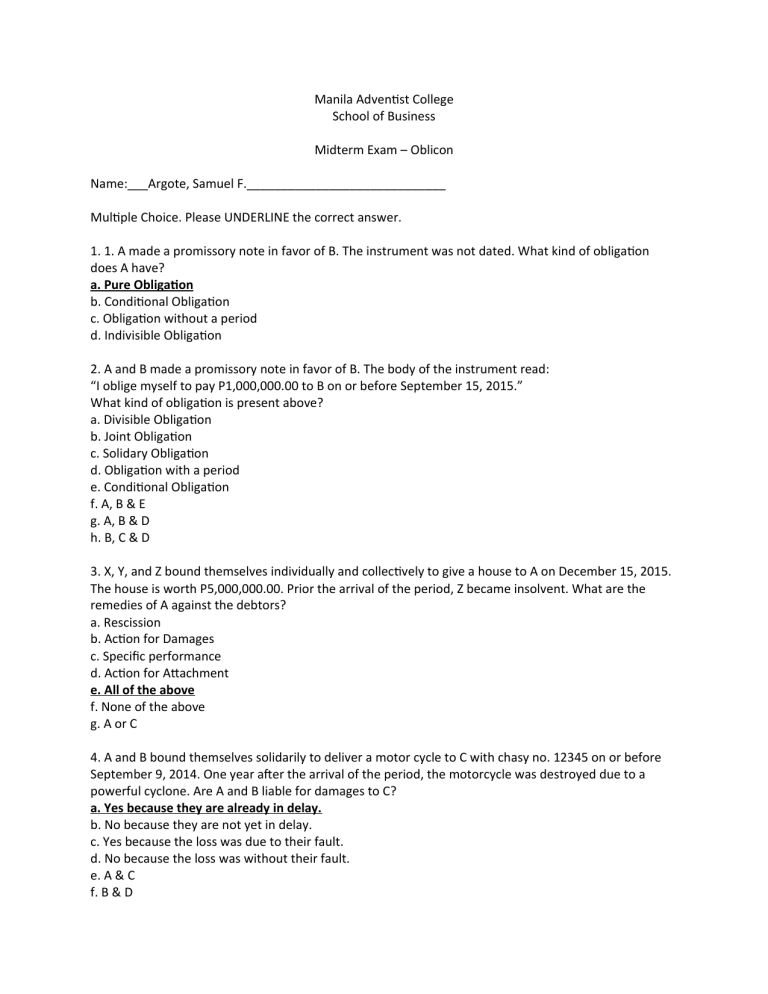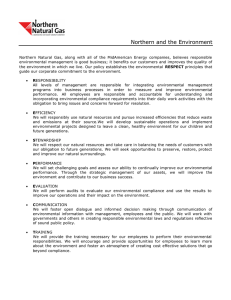
Manila Adventist College School of Business Midterm Exam – Oblicon Name:___Argote, Samuel F._____________________________ Multiple Choice. Please UNDERLINE the correct answer. 1. 1. A made a promissory note in favor of B. The instrument was not dated. What kind of obligation does A have? a. Pure Obligation b. Conditional Obligation c. Obligation without a period d. Indivisible Obligation 2. A and B made a promissory note in favor of B. The body of the instrument read: “I oblige myself to pay P1,000,000.00 to B on or before September 15, 2015.” What kind of obligation is present above? a. Divisible Obligation b. Joint Obligation c. Solidary Obligation d. Obligation with a period e. Conditional Obligation f. A, B & E g. A, B & D h. B, C & D 3. X, Y, and Z bound themselves individually and collectively to give a house to A on December 15, 2015. The house is worth P5,000,000.00. Prior the arrival of the period, Z became insolvent. What are the remedies of A against the debtors? a. Rescission b. Action for Damages c. Specific performance d. Action for Attachment e. All of the above f. None of the above g. A or C 4. A and B bound themselves solidarily to deliver a motor cycle to C with chasy no. 12345 on or before September 9, 2014. One year after the arrival of the period, the motorcycle was destroyed due to a powerful cyclone. Are A and B liable for damages to C? a. Yes because they are already in delay. b. No because they are not yet in delay. c. Yes because the loss was due to their fault. d. No because the loss was without their fault. e. A & C f. B & D 5. A and B bound themselves solidarily to C under the following terms and conditions: 1. A will pay P15,000.00 to C on August 30, 2015. 2. B will pay P30,000.00 to C on December 30, 2016. Their agreement was reduced into writing. On January 1, 2025 C demanded for the payment of the entire P45,000.00 from A. But A refused to pay, arguing that C already slept on his right to collect the debt. Is A correct in refusing to pay? a. No because prescription is not one of the valid defenses in a solidary obligation. b. Yes because prescription is one of the defenses avaliable to a solidary debtor. c. No because the right did not yet prescribe. d. Yes because even if the right did not yet prescribe, applying principles of equity and fairness, C can no longer demand because he already slept on his rights. 6. It is the juridical relation resulting from lawful, voluntary, and unilateral acts by virtue of which the parties become bound to each other to the end that no one shall be unjustly enriched or benefited at the expense of another. a. Agreement b. Vinculum juris c. Contracts d. Quasi-Contracts 7. This takes place when something is received when there is no right to demand it, and it was unduly delivered thru mistake. a. Solutio Indebiti b. Negotiorum Gestio c. Vinculum juris d. Prestation 8. This happened when the creditor make a demand and the obligor fails to deliver the thing. a. Negligence b. Mora solvendi c. Mora accipiendi d. Compensatio morae 9. Demand is not necessary to incur delay when: a. b. c. d. Creditor refuses the performance without just cause. The debtor is guilty of non-performance. Time is the controlling motive If the obligation bears interest 10. When an injury or damage is caused to another, there being fault or negligence andthere is no preexisting contractual relation between the parties, the source of the obligation is: a. Quasi-delicts b. Quasi-contracts c. Contracts d. Delicts Answer the question briefly and concisely. Provide the legal basis 1. D is obliged to deliver 5 bags of powder soap to C 7 days from their agreement. On due date, D delivered 5bags of powder soap mixed with chalk. What is the status of the agreement between D and C? The agreement is valid because the fraud was committed during the performance of the obligation and not during the agreement of the parties. This is a case of incidental fraud (dolo incidente) not causal fraud (dolo causante). 2. D is obligated to C to give specific watch, a specific ring or a specific bracelet. The parties agreed that C will have the right to choose the thing which will be given to him. Before C could make his choice, the watch and the ring are lost through D’s fault, successively. What is the right of C? C may choose the delivery to him of the bracelet, or the price of the watch or the price of the ring plus damages. 3. A, B, C and D are obliged to give X, Y and Z P12,000. X may collect from A how much? P1,000. When the obligation is silent, it is presumed joint.


